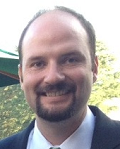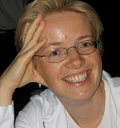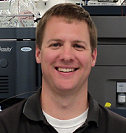The following instructors and speakers have agreed to contribute their expertise to the success of the Targeted Quantitative Proteomics Course at UW:
 |
Michael J. MacCoss, Ph.D. Mike became interested in biomedical applications of mass spectrometry while working in Dr. Patrick Griffin’s protein mass spectrometry lab at Merck Research Laboratories. He obtained a Ph.D. with Professor Dwight Matthews and pursued a postdoc with Professor John R. Yates III. In 2004 he started the MacCoss lab at the University of Washington and it became obvious that while mass spectrometry data could be collected quickly and robustly, the lack of computational tools for the visualization and analysis of these data was a stumbling block. In 2009 he recruited Brendan MacLean with the goal of developing professional quality software tools for quantitative proteomics. Mike has worked closely with the Skyline development team and our outstanding group of laboratory scientists and collaborators to ensure that our software uses analytical approaches that have been thoroughly vetted by the mass spectrometry community. |
|
 |
Brendan MacLean Brendan worked at Microsoft for 8 years in the 1990s where he was a lead developer and development manager for the Visual C++/Developer Studio Project. Since leaving Microsoft, Brendan has been the Vice President of Engineering for Westside Corporation, Director of Engineering for BEA Systems, Inc., Sr. Software Engineer at the Fred Hutchinson Cancer Research Center, and a founding partner of LakKey Software. In this last position he was one of the key programmers responsible for the Computational Proteomics Analysis System (CPAS), made significant contributions to the development of X!Tandem and the Trans Proteomic Pipeline, and created the LabKey Enterprise Pipeline. Since August, 2008 he has worked as a Sr. Software Engineer within the MacCoss lab and been responsible for all aspects of design, development and support in creating the Skyline Targeted Proteomics Environment and its growing worldwide user community. |
|
 |
Michael Bereman, Ph.D. Michael is an assistant professor in the Department of Biological Sciences and a member of the Center for Human Health and the Environment (CHHE) at North Carolina State University in Raleigh, NC. The central focus of his research is to develop innovative, quantitative methodologies to investigate the interplay between environment and genetic factors with respect to human health and disease. The assessment of a vast number of environmental exposures on disease risk remains a critical – yet unfulfilled challenge. His efforts focus on the continued improvements in technology with applications in two key areas: 1) Development of assays to quantify the degree of overall exposure in biological fluids using existing and novel protein modifications; and 2) The elucidation of the impact of various environmental exposures on the etiology of diseases using both human specimens and animal models. Prior to joining NCSU, he held a post-doctoral position in the Department of Genome Sciences at the University of Washington where he focused on instrumentation development, targeted assays for determining protein metabolism, and quality control in proteomics. |
|
 |
Olga Vitek, Ph.D. Olga is a Faculty Scholar and Associate Professor in the Department of statistics and in the Department of Computer Science at Purdue University. The group of Dr. Vitek develops statistical and computational methods for high-throughput experiments in molecular biology, in particular for mass spectrometry-based proteomics. The tools developed by the group include MSstats, an open-source software for statistical analysis of quantitative shotgun, targeted and data-independent proteomic experiments. Dr. Vitek serves on the Editorial Boards of Molecular & Cellular Proteomics and of the Journal of Statistical Planning and Inference. She is a recipient of the NSF CAREER award. |
|
 |
Andy Hoofnagle, MD, Ph.D. Andy is an Associate Professor in the Department of Laboratory Medicine at the University of Washington. His laboratory focuses on developing CLIA-certified assays for small molecules using mass spectrometry. They also investigate the function of high density lipoproteins in patients at increased risk for cardiovascular disease and the translation of proteomics technologies into the clinical laboratory. |
|
 |
J. Will Thompson, Ph.D. Will received his Ph.D. in Ultrahigh Pressure Liquid Chromatography from the laboratory of Dr. Jim Jorgenson at the University of North Carolina at Chapel Hill. He later joined the Disease and Biomarker Proteomics group led by Dr. Arthur Moseley at GlaxoSmithKline and in 2007 assisted Dr. Moseley in founding the Duke Proteomics Core Facility, which is organized under the Duke School of Medicine and now employs seven scientists. The Duke Proteomics Core specializes in high-accuracy label-free differential expression proteomics. Dr. Thompson’s research in part focuses on development of novel approaches for isolation and quantitation of post-translational modifications on a proteome scale. The Core has completed over 300 projects for 100+ principal investigators since 2007, and works with investigators both inside and outside the Duke School of Medicine. |
|
 |
Jeffrey Whiteaker, Ph.D. Jeff is currently Director of Proteomics in the laboratory of Mandy Paulovich at the Fred Hutchinson Cancer Research Center in Seattle, WA. Originally from Arizona, he received a B.S. in Chemistry at the University of Arizona and obtained a PhD from the University of California at Riverside. He pursued post-doctoral research at the University of Maryland in the laboratory of Catherine Fenselau. He has been in the Pacific Northwest since 2004, where his current research focuses on using proteomic techniques to discover and validate biomarkers related to cancer. |
|
 |
Olga Schubert Olga studied Biology at ETH Zurich (Switzerland). During her Masters she focused on cell biology and cancer research. Afterwards, she spent six month in Italy as a trainee at EMBL Monterotondo to gain more insights into mouse biology and neuroscience. In April 2010 she joined the group of Prof. Ruedi Aebersold at the Institute of Molecular Systems Biology, ETH Zurich, where she has been applying mass spectrometry to study the proteome of Mycobacterium tuberculosis. Recently, she developed the Mtb Proteome Library, a database containing quantitative assays for targeted mass spectrometry for all proteins of Mycobacterium tuberculosis. Her current research focus is on proteome-wide absolute quantification of Mycobacterium tuberculosis using SRM and data-independent acquisition (SWATH-MS). |
|
 |
Meena Choi, M.S. Meena is a PhD student in the Department of Statistics at Purdue University, in the group of Olga Vitek. Meena's research is in development of statistical methods for quantitative proteomics, and for discovery of protein biomarkers of disease. Meena is the main developer and maintainer of the open-source software package MSstats for statistical analysis of quantitative proteomic experiments. Since 2012 Meena established a collaboration with Brendan MacLean and the MacCoss lab, with the goal of making MSstats available as an external tool in Skyline. |
|
 |
Vagisha Sharma Vagisha got involved with proteomics at UC San Diego where she worked with Prof. Vineet Bafna. During that time she built her first tools for visualizing Mass Spectrometry data while working at ActivX Biosciences. Since moving to Seattle Vagisha has worked on Mass Spectrometry pipelines for the Aebersold group at the Institute for Systems Biology, and developed a data management system while at the University of Washington Proteomics Resource and the Yeast Resource Center. She joined the Skyline team in October 2011 where she has been the lead developer for the Panorama Targeted Proteomics Knowledge Base. |